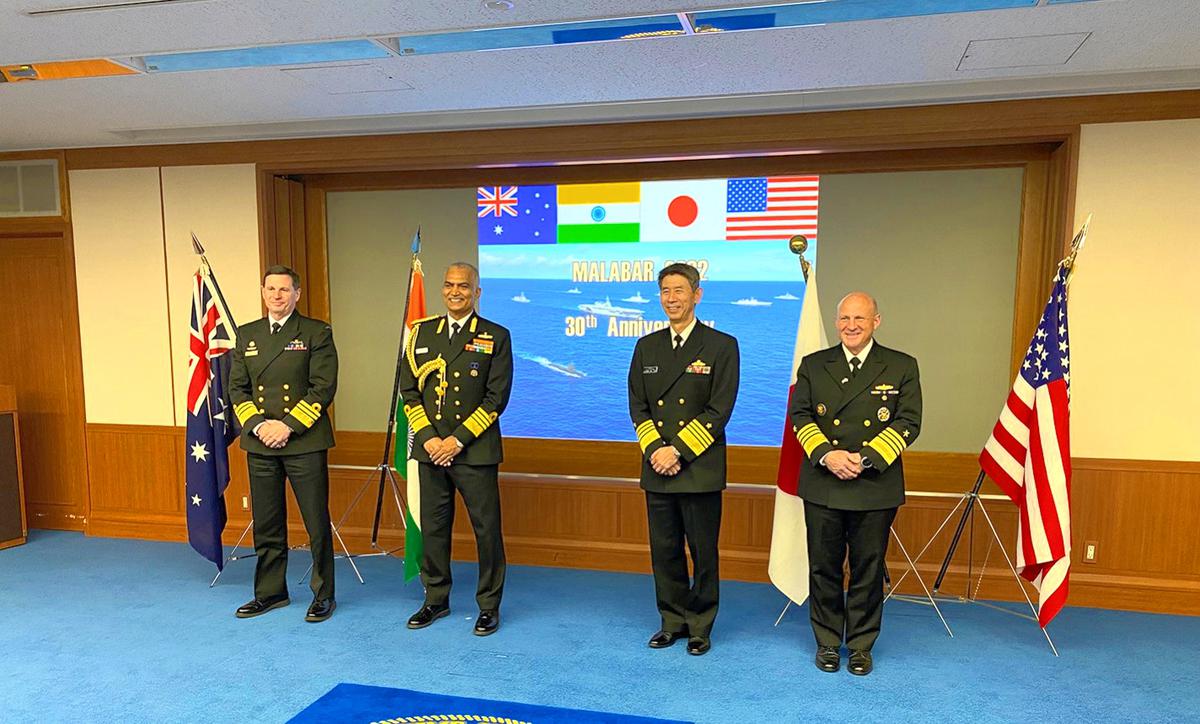
IFR ends; Malabar naval exercise gets under way in Japan
The Hindu
Pakistan and South Korea were also part of IFR while China joined the WPNS
Amid the recent missile tests by North Korea and the continuing war in Ukraine, the Malabar multilateral naval exercise involving India, Australia, Japan and U.S. got under way on Tuesday as the International Fleet Review (IFR) and the 18th Western Naval Pacific Symposium (WPNS), also hosted by Japan, concluded. Pakistan and South Korea also participated in the IFR and the WPNS while China, which declined invitation for IFR, participated in the WPNS.
An earlier invitation extended to Russia was cancelled by Japan due to the Ukraine war. In all, the IFR held on Sunday saw the participation of 13 countries while the WPNS on Monday and Tuesday had the presence of 27 countries.
“Held IFR-2022 with the participation of naval vessels and aircraft from 13 countries. We will contribute to realise a ‘free and open ocean’ through confidence-building and friendship with the navies of the WPNS member-countries,” the Japanese Maritime Self Defence Force (JMSDF) said.
The JMSDF which hosted the IFR to commemorate its 70th anniversary also conducted a multilateral search and rescue exercise with the participating navies which, it said, was to improve the JMSDF’s tactical capabilities and to promote mutual understanding with the participating navies.
In the past, India, China and Pakistan have taken part in Army exercises conducted by Russia or under the ambit of the Shanghai Cooperation Organisation (SCO). While China is a full member of the WPNS, India and Pakistan are observers.
In the past, India could not attend the WPNS due to delay in approval from the Defence Ministry. In early 2020, Philippines had hosted the WPNS workshop 2020 for which India was invited but the Defence Ministry did not approve the participation in time.
South Korea’s participation is a sign of warming ties with Japan, which saw lot of friction a few years back, amid repeated missile tests and provocation by North Korea. In 2018, Japan refused to join a fleet review by South Korea after Tokyo was asked not to fly its flag showing the rising sun, and in 2019 Tokyo refused to invite South Korea to a planned fleet review, which was eventually cancelled, due to a maritime incident.

Several principals of government and private schools in Delhi on Tuesday said the Directorate of Education (DoE) circular from a day earlier, directing schools to conduct classes in ‘hybrid’ mode, had caused confusion regarding day-to-day operations as they did not know how many students would return to school from Wednesday and how would teachers instruct in two modes — online and in person — at once. The DoE circular on Monday had also stated that the option to “exercise online mode of education, wherever available, shall vest with the students and their guardians”. Several schoolteachers also expressed confusion regarding the DoE order. A government schoolteacher said he was unsure of how to cope with the resumption of physical classes, given that the order directing government offices to ensure that 50% of the employees work from home is still in place. On Monday, the Commission for Air Quality Management in the National Capital Region and Adjoining Areas (CAQM) had, on the orders of the Supreme Court, directed schools in Delhi-NCR to shift classes to the hybrid mode, following which the DoE had issued the circular. The court had urged the Centre’s pollution watchdog to consider restarting physical classes due to many students missing out on the mid-day meals and lacking the necessary means to attend classes online. The CAQM had, on November 20, asked schools in Delhi-NCR to shift to the online mode of teaching.










